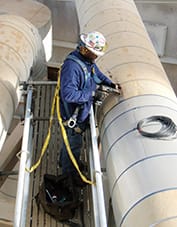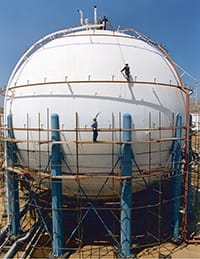Acoustic Emission Testing


Stress Engineering Services is a world-renowned authority in Acoustic Emission Testing (AET). Our expertise extends beyond the mere ability to conduct AET; we use our immense capabilities and experience to fully analyze AET results to determine how they impact fitness for service.
AET is a powerful, non-intrusive inspection technique to verify the structural integrity of pressure vessels, spheres, high-temperature reactors and piping, coke drums, above-ground storage tanks, cryogenic storage tanks, and more. Because the inspection is performed externally and avoids costly shut-downs, AET can save users millions of dollars annually. There are other cost-saving advantages of AET as well.
Global, Simultaneous Inspection
AET can inspect an entire unit/system simultaneously, including pressure vessels, heat exchangers, several reactors and piping in a single operation. This is done through an in-service over-pressurization, or during a scheduled cool-down using thermal stresses imposed by the temperature gradients across reactor walls and piping systems.
AET Identifies Only Active Defects
AET is based on the principle that only defects that are actually growing under a specific damage mechanism (i.e., SCC, wet H2S cracking, thermal fatigue, creep, etc.) can generate genuine AE signals. Consequently, old fabrication defects and stable cracks will not be detected because these defects are not actively growing. Repairs, if necessary, can be made only on the areas that contain defects significant to the structural integrity of the vessel.
AET Avoids Internal Inspection and Extends Life
Under current engineering standards, if a vessel is inspected by AET and no significant defects are found, a plant has the option to continue operating the equipment for an extended number of years until the next inspection date.



